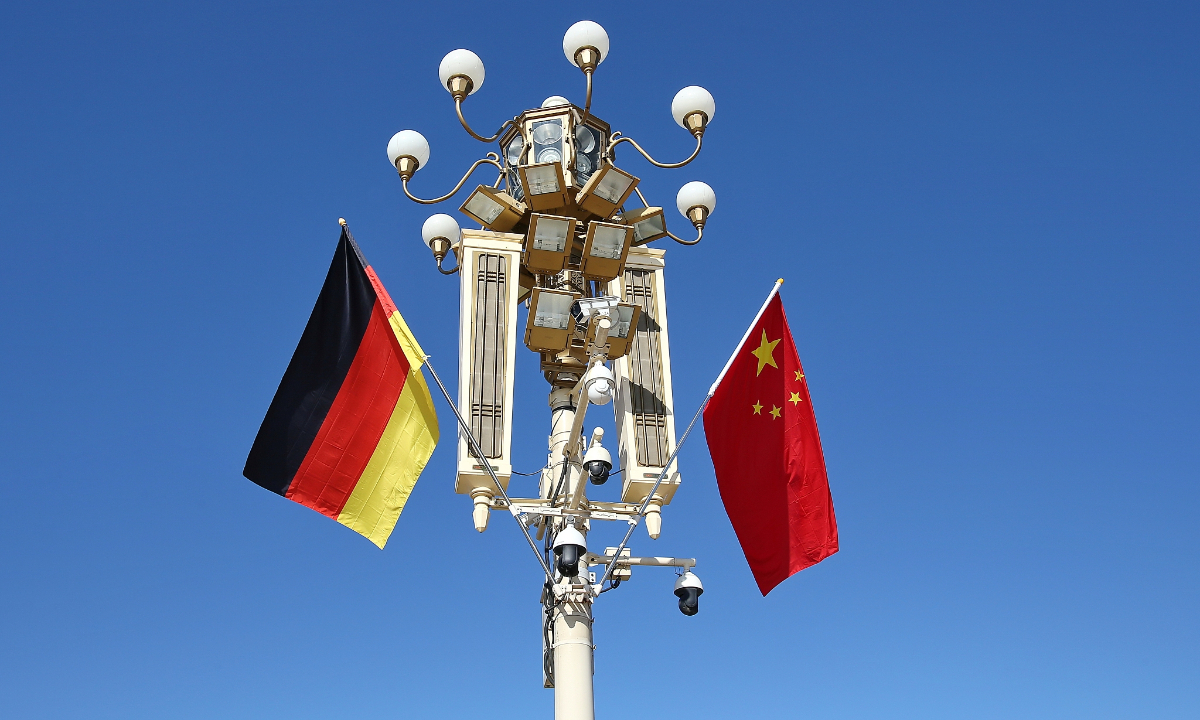German firms bullish on China ahead of Scholz's visit
Vast majority of businesses plan to continue investments: survey

China Germany Photo:VCG
Ahead of German Chancellor Olaf Scholz's visit to China, a survey released by the German Chamber of Commerce in China revealed that 79 percent of the German companies surveyed in China plan to continue their investments, affirming their confidence in the China's robust economic foundations.
China is the most important trading partner for Germany. Maximilian Butek, executive director at the German Chamber of Commerce in China, said in underscoring China's key role as Germany's most significant trading partner during a Wednesday conference.
Despite facing a challenging competitive environment, German businesses deem China as an essential market and they intend to sustain their presence, the survey indicated.
Our short studies show that German companies are still confident in the Chinese market as the fundamentals are right. We also see that over half of the companies are investing in China, which is a strong commitment that they are confident about the long-term outlook for the Chinese economy, said Butek.
The comprehensive report, which focused on the competitiveness of German companies in China, involved contributions from 150 firms spanning various industries such as machinery, industrial equipment, vehicles, business services and electronics.
Scholz is expected to begin his four-day visit this Saturday, with an agenda likely to focus on economic ties. The delegation will include high-profile CEOs such as Siemens' Roland Lopez, Mercedes-Benz's Ola Kaellenius, BMW's Oliver Zipse, Bayer's Bill Anderson and Thyssenkrupp's Miguel Lopez, reflecting the high stakes involved in deepening German-Chinese economic relations.
Notably, CEOs including Kaellenius, Anderson and Lopez recently visited China during the China Development Forum, so it would be their second visits to China within a month.
"German CEOs treat the Chinese market with utmost attention," Butek said of the strategic importance of the Chinese market, evidenced by German firms' rising investments and positive stances on China's market potential.
In 2023, German investment in China rose 4.3 percent to 11.9 billion euros ($12.9 billion), a record high, Reuters reported.
According to data released by China's Ministry of Commerce, in the first two months of 2024, German direct investment in China rose 19.8 percent year-on-year.
Amid a global economic downturn and minor recessions in Europe, including in Germany, the Chinese market presents a substantial attraction for German businesses, Sun Yanhong, a senior research fellow at the Institute of European Studies under the Chinese Academy of Social Sciences, told the Global Times on Wednesday.
The strong interest by German companies in joining the delegation underscores their confidence in China as a major market and a critical production base, Sun added.
The report also acknowledges the growing competitiveness of Chinese firms. This trend is more obvious in the automotive sector, where 58 percent of respondents foresee Chinese firms becoming innovation leaders, and 11 percent of them already view their Chinese counterparts as industry leaders in innovation.
The German Chamber of Commerce in China also addressed the EU's consideration of customs registration and potential tariffs on Chinese electric vehicle (EV) imports, advocating for a fair, open and fact-based analysis and strongly opposing any tariffs against Chinese EVs.
This stance highlights ongoing economic and political friction between China and the EU as Scholz's visit nears, with economic discussions expected to be at the forefront of the agenda.

